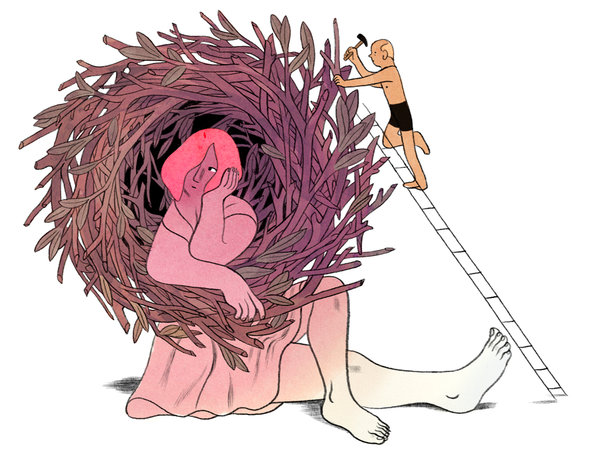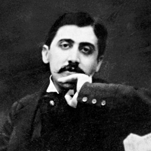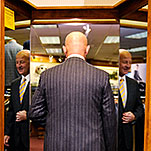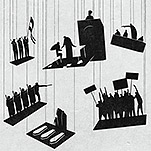When their last child left for college, Arlene Petty, now 64, felt resentment about her decades-long marriage to Ed Petty, also now 64. Facing an empty nest, she asked for a trial separation. In hindsight, both would have done things very differently.
Unhitched
When Nest Emptied, Discontent Entered

By LOUISE RAFKIN
Published: November 7, 2013
Marriage: In 1974 they began living together and married in 1976. They divorced in 2004 after 28 years.
Age when married: He: 26. She: 27.
Occupation: She is a senior lecturer in English and ethnic studies at the University of Wisconsin, Milwaukee. He is a management consultant in the health industry, in a business partnership with her brother.
Children: Three. She had a 3-year-old son, now 44, from a previous marriage when they met. Together: a son, now 36, and a daughter, 32. Now they have five grandchildren.
Where did they grow up?
She grew up in a close, loving Milwaukee family. He, in a rural California town in a family that was not close or demonstrative. His father owned a truck stop and several small businesses. “Work was the most important thing in my father’s life,” Mr. Petty said. “He slept every other night.”
Where did they meet?
In 1972, they met in Northern California at a self-help center where both were exploring a spiritual movement that was popular then.
What was it about the other?
Arlene: He was handsome and smart. “I was seeking answers to the social and personal problems of the time and he was, too.”
Ed: She’s a great communicator, kind, smart and giving. “For me it was fairly simple: she really loved me and we had great chemistry.”
Reasons for marrying?
A shared dedication to fixing the “ills of the world,” which were being addressed by the self-help, peace and antiwar movements.
Arlene: “I had never been in love like that before.” Also, he was a good father to her son. Both wanted more children.
Ed: “Arlene had a strong sense of family and I admired that. My childhood home was like being in the wild West: my father tipped his hat at me, maybe he shook my hand.”
First signs of trouble?
Nine years in, faced with financial problems, they moved from California to her hometown of Milwaukee. He started a business with her brother and traveled for work, sometimes two weeks a month, which strained the relationship.
Arlene: Felt he worked too much, on the road and also at home. Wanted him to connect more with the children, to know details of their lives. She gave up working to be a stay-at-home mother and felt jealous of his “freedom” to have a career and everything handled at home.
“This division of labor was the best we could come up with, and yet I felt somewhat trapped inside these roles and sometimes resented it.”
Ed: Admits to being more focused on work and on social change than on their children. “I’m not a natural workaholic, but we were always in a financial struggle. Working for myself meant more than working 9 to 5. There was never enough time to get our romance on.”
What pushed them apart?
Arlene: When their last child left for college, the glue that kept them together seemed to dissolve. Studying for a Ph.D., she felt increasing discontent. In 2001, she asked for a trial separation.
Ed: Felt she always wanted more connection and romance. His resentment about being criticized was growing. They talked about the separation being temporary, but when it happened he was devastated.
During their first year of separation, they tried to reconcile several times, but also dated other people.
Did they try therapy?
Arlene: Yes, they worked on improving communication. He liked her the way she was and believed he was being accused of “being the reason the relationship wasn’t working.” In individual therapy, she saw that her expectations of him were not realistic. “Instead of accepting the love he offered, I kept trying to get this ‘deeper’ connection from him.”
Ed: The first therapist was a complete loser; he found another for them together and one for himself. “I don’t think any of them nailed me or her. I felt like I was running our sessions.”
The final breakup:
Ed: He lost romantic feelings for her. “I’m monogamous. I couldn’t be intimate with her after all that happened.” A year later, he met someone new and fell in love.
Arlene: “I thought Ed would be in love with me forever, that he wouldn’t find anyone for him better than me.” The new girlfriend, she thought, didn’t want to change him.
How did they feel?
Ed: Terrible — despite the new relationship.
Arlene: Freedom, at first. Dating was less enjoyable than she had imagined.
In retrospect, was their downfall about expectations?
- 1
- 2







